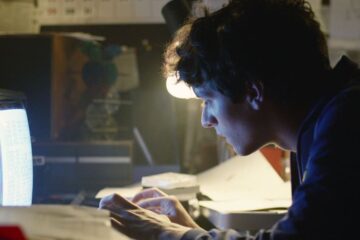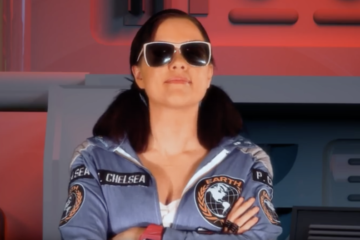Lost and found…
By no means a comprehensive list, here is a snapshot of electronic music from between 1990 to 1999 featuring 30 near-hits, minor hits, flops and oddities.
Not all of these were released in the UK, with many treasures emanating from other European territories in a period when the guitar returned with a vengeance through Grunge and Britpop.
BEAT CLUB featuring Bernard Sumner Security (1990)
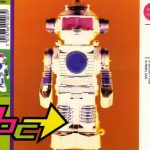 This was the first ever release on Rob’s Records; the ‘Rob’ in question being the late Rob Gretton, famed manager of New Order. The Miami duo, comprising members Ony Rodriguez and Mirey Valls, had originally released the house music staple, ‘Security’, on Atlantic Records in 1988 before signing with Gretton’s fledgling label. Bernard Sumner’s additional remix and production saw an overhaul of the original version, with the addition of his crucial vocal contribution giving it a predictably New Order-esque sheen. Other notable acts signed to Gretton’s label were A Certain Ratio and fellow Mancunians Sub Sub who scored a huge hit with ‘Ain’t No Love (Ain’t No Use)’. Sumner had ties with both bands, and guested on the latter’s more guitar-oriented ‘This Time I Ain’t Wrong’ single… Sub Sub would of course metamorphose as indie act Doves.
This was the first ever release on Rob’s Records; the ‘Rob’ in question being the late Rob Gretton, famed manager of New Order. The Miami duo, comprising members Ony Rodriguez and Mirey Valls, had originally released the house music staple, ‘Security’, on Atlantic Records in 1988 before signing with Gretton’s fledgling label. Bernard Sumner’s additional remix and production saw an overhaul of the original version, with the addition of his crucial vocal contribution giving it a predictably New Order-esque sheen. Other notable acts signed to Gretton’s label were A Certain Ratio and fellow Mancunians Sub Sub who scored a huge hit with ‘Ain’t No Love (Ain’t No Use)’. Sumner had ties with both bands, and guested on the latter’s more guitar-oriented ‘This Time I Ain’t Wrong’ single… Sub Sub would of course metamorphose as indie act Doves.
Available on the CD single ‘Security’ via Rob’s Records
www.discogs.com/artist/Beat+Club,+The
KON KAN Liberty (1990)
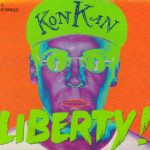 The brainchild of vastly talented Canadian DJ, remixer and musician, Barry Harris, Kon Kan burst onto the scene in 1989 with the award-winning New Order-esque international hit ‘I Beg Your Pardon’. Subsequent singles such as the Pet Shop Boys-influenced ‘Harry Houdini’ failed to dent the UK charts. ‘Liberty’, the lead-off single from their excellent second album Syntonic, also sank without a trace upon its release in the autumn of 1990. By this time, Kon Kan was effectively a solo vehicle for Harris, following lead singer Kevin Wynne’s departure after the Move To Move album. Liberty is a brilliant pop song showcasing both Harris’ deadpan vocal delivery and his strong melodic sensibilities. Background vocals were courtesy of Debbe Cole whose CV includes Malcolm McClaren’s brilliant Stephen Hague-produced hit single ‘Madam Butterfly’ from 1984. Kon Kan released a third and final album Vida! in 1993 but, once again, it was not successful.
The brainchild of vastly talented Canadian DJ, remixer and musician, Barry Harris, Kon Kan burst onto the scene in 1989 with the award-winning New Order-esque international hit ‘I Beg Your Pardon’. Subsequent singles such as the Pet Shop Boys-influenced ‘Harry Houdini’ failed to dent the UK charts. ‘Liberty’, the lead-off single from their excellent second album Syntonic, also sank without a trace upon its release in the autumn of 1990. By this time, Kon Kan was effectively a solo vehicle for Harris, following lead singer Kevin Wynne’s departure after the Move To Move album. Liberty is a brilliant pop song showcasing both Harris’ deadpan vocal delivery and his strong melodic sensibilities. Background vocals were courtesy of Debbe Cole whose CV includes Malcolm McClaren’s brilliant Stephen Hague-produced hit single ‘Madam Butterfly’ from 1984. Kon Kan released a third and final album Vida! in 1993 but, once again, it was not successful.
Available on the CD album Syntonic via Atlantic Records
www.discogs.com/artist/Kon+Kan
CICERO featuring SYLVIA MASON-JAMES Live For Today (1991)

Whilst there was no single from the Pet Shop Boys in 1992, the spectre of messrs Tennant and Lowe loomed large on ‘Love Is Everywhere’, a top 20 hit for Scottish artist Cicero who had signed to their Spaghetti Records label the previous year (you may recall that the song is essentially Pet Shop Boys with bagpipes!). Cicero’s only album Future Boy, despite heralding a strong contribution from the Pet Shop Boys, unfortunately didn’t emulate this success, despite containing a number of worthy tracks. His final – and arguably greatest – collaboration with Tennant and Lowe was ‘Live For Today’, taken from the soundtrack of the 1992 film, The Crying Game. Backing vocals were provided by Sylvia Mason-James who had sung on Jimmy Nail’s insipid number one hit, ‘Ain’t No Doubt’. Whilst Boy George had earned a hit single from the same film, the same fate wouldn’t befall Cicero and he soon faded from public attentions. He would later reappear in the mid-1990s with some uninspiring dance tracks, including a terrible cover of Soft Cell’s ‘Say Hello, Wave Goodbye’.
Available on the CD single ‘Live For Today’ via Spaghetti Records
THE OTHER TWO Tasty Fish (1991)
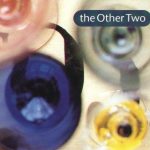
Following the career-best Technique album in 1989, New Order’s four members would all work on side projects. Bernard Sumner had formed Electronic with musical journeyman Johnny Marr; Peter Hook had tentatively started his Revenge project, while Gillian Gilbert and Stephen Morris eventually formed the appropriately, but rather lazily named The Other Two With Factory Records teetering on the brink, their one and only single on the label was released in October 1991. Amusingly titled ‘Tasty Fish’ after a Fish and Chip shop near Stockport, this catchy electropop single, boasting a surprisingly assured vocal from Gilbert sounded terrific on the radio. The single disappointingly stalled at no. 41. The collapse of Factory Records meant a lengthy delay for The Other Two’s debut album, which eventually surfaced late 1993, prefaced by the fine single ‘Selfish’. Their second album Super Highways was released in 1999.
Available on the CD album And You via LTM Records
REVENGE State Of Shock (1991)
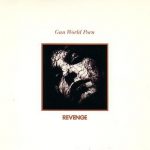
Revenge were formed by Peter Hook in the wake of an enforced hiatus from New Order. This brilliant 6-minute plus track, originally from the Gun World Porn EP, is quite simply one of the best tracks that New Order never recorded! From the deadpan vocals to the distinctive melodic basslines, ‘State Of Shock’ exemplified all that was good about New Order. Sadly, the latter’s next three albums would only contain flashes of the brilliance that made them such a creative and inspirational force in the 1980s. Amongst Revenge’s members was David Potts who would be retained for Hooky’s next side project Monaco.
Available on the CD album One True Passion (v2.0) via LTM Records
WOLFSHEIM The Sparrows & The Nightingales (1991)

A truly classic synth-pop single. Named after a character in F Scott Fitzgerald’s The Great Gatsby, electronic duo Wolfsheim scored a hit in their native Germany with memorable debut single, ‘The Sparrows and the Nightingales’. Combining a strong synth melody with Peter Heppner’s poetic lyrics, this was one of the standout singles in 1991. Between 1992 and 2003 Wolfsheim would release five studio albums before an acrimonious split saw the Hamburg duo of Heppner and Markus Reinhardt end up in court over the rights to the name. Heppner finally released his debut album, appropriately titled Solo, in 2008. Interestingly, his distinctive vocals would later end up on a recording with compatriot Nena of ’99 Red Balloons’ fame.
Available on the CD album No Happy View via Strange Ways Records
NEIL ARTHUR One Day, One Time (1992)
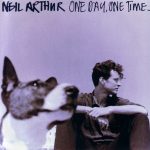
By the time of disappointing third album, Believe You Me, the Blancmange brand had run its (third) course. Whilst there was still a market for synth duos in the mid-1980s (see Pet Shop Boys and Erasure), Neil Arthur and Stephen Luscombe decided to call it a day. Luscombe would eventually release an album with side project West India Company with regular Blancmange collaborator Pandit Dinesh, called Music From New Demons in 1989. Arthur, meanwhile went solo and released the engaging ‘One Day, One Time’ single in 1992. The single is not a radical departure from the Blancmange’s musical template; in fact, the track features David Rhodes, their regular session guitarist. It is also notable in that it features programming from renowned music producer (and former Blow Monkeys keyboardist!) Marius de Vries. The next, rather pedestrian single ‘I Love I Hate’ didn’t trouble the charts. Arthur and Luscombe reunited for the well received Blanc Burn album in 2011.
Available on the CD album Suitcase via Chrysalis Records
RECOIL Faith Healer (1992)
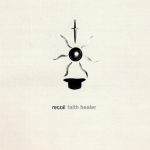
Recoil is the brainchild of Alan Wilder, who left Depeche Mode on his 36th birthday in 1995, following the exhausting Devotional tour. He had released his first Recoil recordings in 1986. ‘Faith Healer’, a cover version of a track by The Sensational Alex Harvey Band, was from Recoil’s second album Bloodline in 1992. The album gave some pointers as to the direction that DM would undertake on their next album, Songs of Faith and Devotion, which would herald a harder-edged and rawer sound than that of its predecessor, Violator. On Bloodline, Wilder was utilising outside vocalists such as Moby and Curve’s Toni Halliday to complement his experimental, electro-industrial productions. ‘Faith Healer’ was no exception in that it featured Mute label mate Douglas McCarthy of Nitzer Ebb. The pair had already been acquainted during the sessions for Nitzer Ebb’s 1991 album Ebbhead which Wilder had produced.
Available on the CD album Selected via Mute Records
S.P.O.C.K. Never Trust A Klingon (1992)
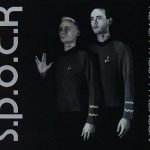
With The Next Generation still being broadcast to hoards of devoted Trekkies in the early 1990s, the Star Trek franchise was showing no signs of abating. In 1992, a Star Trek-loving synth-pop act named S.P.O.C.K. (Star Pilot On Channel K) scored an unlikely hit in Germany with ‘Never Trust A Klingon’. The quirky Swedish band were originally called Mr Spock but an official approach to Paramount Pictures for the rights to the name resulted in disappointment – in the words of their official biography, the response was a slightly condescending “that’ll be expensive, guys!” Slightly clunky, musically, but lyrically hilarious, ‘Never Trust A Klingon’, still sounds great today. It is also notable for its sampled dialogue of Captain James T. Kirk in Star Trek III – The Search For Spock memorably declaring: “Klingon bastard! You killed my son!” Parent album Five Year Mission and subsequent albums such as Alien Worlds haven’t aged as well, with the novelty wearing thin fairly quickly… although there’s plenty for Trekkies to enjoy, with the likes of ‘Mr Spock’s Brain’, ‘Trouble With Tribbles’ and ‘Dr McCoy’ amongst their electro-goth repertoire.
Available on the CD album Five Year Mission via Energy Rekords
DE/VISION Dinner Without Grace (1993)

Still relatively unknown in the UK, De/Vision are one of the finest and most prolific electronic bands to have emerged in the last 25 years. Hailing from Darmstadt in Germany, they were formed in 1988 with members Steffen Keth and Thomas Adam the mainstays of the band. While there is some merit to some cruel claims that the band are mere Depeche Mode copycats, particularly when you hear some of the early recordings (collected on 1995’s Antiquity), the band’s sound has evolved over the years, encompassing a variety of electro genres. ‘Dinner Without Grace’ with its infectious tune, fluid bassline, and lyrics that recall latterday Gary Numan, was a fine single typifying the band’s sound from their formative years. Eleven studio albums into their career they still continue to deliver consistently appealing synth-pop, something Depeche Mode have, arguably, only managed to do in fits and bursts since their 1990 peak.
Available on the CD album World Without End via Strange Ways Records
ELEGANT MACHINERY Hard to Handle (1993)
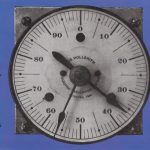
Elegant Machinery were part of a burgeoning scene of Swedish synth-pop acts to emerge in the 1990s (see also Covenant, S.P.O.C.K. and Page). This single from their second album typified their early 1980s electronic influences, the band citing Depeche Mode, Yazoo and The Human League as their main sources of inspiration. But it’s the former of this triumvirate of Synth Britannia masters that engrain themselves most in the music of Elegant Machinery, with a typically cynical Gore-ish lyric cutting through the Some Great Reward-era electronics. The band originally split after three albums in 1999, before reforming in 2005. They released another album, titled A Soft Exchange in 2008 before breaking up part way into the production of a fifth album. Member Richard Jomshof was elected as a Swedish MP in 2010.
Available on the CD album Shattered Grounds via Energy Rekords
ELEKTRIC MUSIC TV (1993)

“In press the key, and watch TV”… you can just picture Messrs Hütter and Schneider from Kraftwerk kicking themselves having not thought of such a simplistic couplet, one which certainly wouldn’t have sounded out of place on an album such as Computer World. Having become disillusioned with the working practices of his former employers, Karl Bartos left Kraftwerk in 1990 and formed Elektric Music with Lothar Manteuffel. The first fruits of this collaboration were via NME’s Ruby Trax compilation and a risible, vocoder-heavy cover version of The Equals’ ‘Baby Come Back’. But it was ‘TV’ that really stood out, with its simple lyrics underpinned by a wonderful melody that proved that Bartos really was the creative equal of his Kling Klang compatriots. Bartos had, of course, already proven himself as a competent vocalist on lacklustre Electric Café’s standout cut, ‘The Telephone Call’. The parent album Esperanto was notable for the two collaborations with OMD’s Andy McCluskey on ‘Showbusiness’ and ‘Kissing The Machine’. The latter was certainly the perfect antidote for those disappointed with that year’s overproduced, and decidedly patchy OMD album, Liberator. Bartos would later collaborate with Electronic on their second album, Raise The Pressure, before committing career suicide dabbling with guitars on follow-up album, Electric Music. He is currently working on the follow-up to 2003’s back-to-form solo album, Communication.
Available on the CD album Esperanto via SPV Records
ULTRAVOX Systems Of Love (1993)
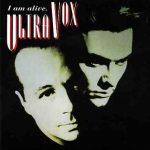
Following the Ultravox split in 1987, Billy Currie released a brace of solo albums before forming a new version of his former band in 1992 with vocalist Tony Fenelle. Could they repeat the success of his predecessors whilst simultaneously banishing the memory of 1986’s decidedly naff U-Vox opus?! Sadly, the answer was an emphatic NO! A reasonably faithful re-recording of ‘Vienna’ was followed in 1993 by an album of original material. Revelation, despite its bold title, was actually nothing of the sort. Single ‘I Am Alive’ was a good indicator of what was to come; pleasant but uninspiring AOR that was permeating the airwaves at the time like Living In A Box. Indeed, its co-writer and producer, Rod Gammons, currently boasts a CV that includes David Hasselhoff! But the single’s B-side ‘Systems Of Love’ was much more palatable. With its Numan-esque metal rhythms, and a breathtaking 30-second instrumental break 3 minutes in, there were glimpses of the Currie magic. But these moments were few and far between on an album lacking in both inspiration and invention. Fenelle’s tenure was as shortlived and he was replaced by Sam Blue for 1994’s Ingenuity album, which was even worse than its predecessor! Of course, the classic Midge Ure-fronted line-up of Ultravox has since reformed.
Available on the CD album Revelation via Puzzle Records
WILLIAM ORBIT featuring BETH ORTON Water From A Vine Leaf (1993)
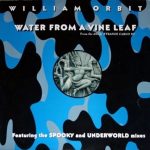
William Orbit is perhaps best known for his club hit ‘Barber’s Adagio for Strings’, as well as his creative production work with Madonna and Blur. He is also a highly respected remixer, with Kraftwerk, OMD, Erasure, Depeche Mode, The Human League and Camouflage amongst his considerable list of clients. He was also the driving force behind Bassomatic, who had a top 10 hit with ‘Fascinating Rhythm’ in 1990. ‘Water from a Vine Leaf’ is an electro-ambient single from 1993, featuring Orbit’s trademark production and an understated vocal from a then relatively unknown Beth Orton who went on to have a big hit with her acclaimed second album, Trailer Park.
Available on the CD album The Best of Strange Cargos via IRS Records
ALPHAVILLE Fools (1994)
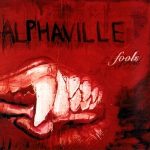 Much like A-Ha, Alphaville’s sound had steadily strayed from their synth-pop origins, becoming more guitar-oriented in the early to mid-1990s. And continuing with the comparisons with their Europop contemporaries, the vocal from Marian Gold on this single is decidedly Morten Harket-esque in its delivery. Whilst Gold’s plea to “keep on dancing” isn’t quite in keeping with this medium-paced, radio-friendly track, it’s still a fine single. The band are still active and released a new album, Catching Rays On Giant in 2010.
Much like A-Ha, Alphaville’s sound had steadily strayed from their synth-pop origins, becoming more guitar-oriented in the early to mid-1990s. And continuing with the comparisons with their Europop contemporaries, the vocal from Marian Gold on this single is decidedly Morten Harket-esque in its delivery. Whilst Gold’s plea to “keep on dancing” isn’t quite in keeping with this medium-paced, radio-friendly track, it’s still a fine single. The band are still active and released a new album, Catching Rays On Giant in 2010.
Available on the CD album Prostitute via WEA Records
A CERTAIN RATIO Shack Up – Electronic Remix (1994)

Arguably the cult band’s best known song, A Certain Ratio’s original version of ‘Shack Up’ (actually a cover of an obscure track by Banbarra in the mid-1970s) was originally released in 1980 but has manifested itself in a variety of versions since, notably by Norman Cook in 1990 and with Electronic (aka Bernard Sumner and Johnny Marr) in 1994. The latter’s excellent production and remix of this iconic track retains the original track’s trademark funky guitar, but with a faster-paced, more synth-driven gloss. Sumner also provided the highlight of ACR’s MCR album, remixing the excellent ‘Won’t Stop Loving You’.
Available on the CD single Shack Up via MCA Records
INTERNATIONAL CHRYSIS Rebel Rebel (1994)
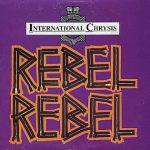
Five studio albums into their career, Dead Or Alive went into semi-retirement in the early 1990s. Long-term members Pete Burns and Steve Coy would eventually resurface as International Chrysis (named after a transsexual performer who had died in 1990). Released on the PWL label, this one-off single was, appropriately, a high-energy version of David Bowie’s gender-bending 1974 single, ‘Rebel Rebel’, with an intro evoking Echo And The Bunnymen’s ‘The Cutter’. Coincidentally (or not), this non-charting single was dedicated to Courtney Love who, of course, had befriended Ian McCulloch whilst living in Liverpool in the early 1980s. Rendering the project completely pointless, ‘Rebel Rebel’ and its B-side, ‘The Right Stuff’, both ended up on the next Dead Or Alive album, Nukleopatra, in 1995.
Available on the Dead Or Alive CD album Nukleopatra
THE LISTENING POOL Meant To Be (1994)
 Creatively washed up, and drained by their attempts to crack the US market, OMD split at the end of the 1980s. Whilst co-founder and singer Andy McCluskey pondered his next move, his former band colleagues Paul Humphreys, Martin Cooper and Malcolm Holmes resolved to record as a trio. McCluskey bought the rights to the OMD name and released what would become 1991’s Sugar Tax album. Meanwhile, The Listening Pool, for legal reasons, couldn’t release any material until McCluskey’s album was in the shops. In 1993 their charming, but underwhelming debut single, ‘Oil For The Lamps Of China’ promptly bombed. The band’s organic sound was as far removed from OMD’s Kraftwerk-inspired roots and was more akin to latter day China Crisis. Debut album, Still Life was released to mixed reviews in 1994 and followed the same commercial fate as the single. It was a shame because it was a fine album. One of the album’s best tracks, the second single ‘Meant To Be’, retained much of OMD’s melodic charms. The band would soldier on for another couple of years before calling it a day part way into the recording of a second album.
Creatively washed up, and drained by their attempts to crack the US market, OMD split at the end of the 1980s. Whilst co-founder and singer Andy McCluskey pondered his next move, his former band colleagues Paul Humphreys, Martin Cooper and Malcolm Holmes resolved to record as a trio. McCluskey bought the rights to the OMD name and released what would become 1991’s Sugar Tax album. Meanwhile, The Listening Pool, for legal reasons, couldn’t release any material until McCluskey’s album was in the shops. In 1993 their charming, but underwhelming debut single, ‘Oil For The Lamps Of China’ promptly bombed. The band’s organic sound was as far removed from OMD’s Kraftwerk-inspired roots and was more akin to latter day China Crisis. Debut album, Still Life was released to mixed reviews in 1994 and followed the same commercial fate as the single. It was a shame because it was a fine album. One of the album’s best tracks, the second single ‘Meant To Be’, retained much of OMD’s melodic charms. The band would soldier on for another couple of years before calling it a day part way into the recording of a second album.
Available on the CD album Still Life via Telegraph Records/Fin Music
http://thelisteningpool.finmusic.co.uk
INTASTELLA The Night (1995)
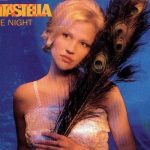 Perhaps best described as a poor man’s Saint Etienne, Intastella had started life as indie band Laugh before taking a more dance-oriented direction upon their formation in the early 1990s. ‘The Night’ was a highly enjoyable and respectful version of the 1975 hit by Frankie Valli and the Four Seasons, but it unfairly stiffed at no 60. Fellow Northern Soul enthusiasts Soft Cell would later record a version of ‘The Night’ for their 2002 comeback album, Cruelty Without Beauty. The duo had actually considered recording the song for their 1981 debut album, but opted for the lesser known ‘Tainted Love’ instead – in hindsight, the best decision they ever made! As for Intastella, the Manchester–based combo would release three albums and a string of singles, but they were not successful. Singer Stella Grundy eventually turned to acting, and wrote and starred in a play about the troubled singer Nico. She is currently a drama coach.
Perhaps best described as a poor man’s Saint Etienne, Intastella had started life as indie band Laugh before taking a more dance-oriented direction upon their formation in the early 1990s. ‘The Night’ was a highly enjoyable and respectful version of the 1975 hit by Frankie Valli and the Four Seasons, but it unfairly stiffed at no 60. Fellow Northern Soul enthusiasts Soft Cell would later record a version of ‘The Night’ for their 2002 comeback album, Cruelty Without Beauty. The duo had actually considered recording the song for their 1981 debut album, but opted for the lesser known ‘Tainted Love’ instead – in hindsight, the best decision they ever made! As for Intastella, the Manchester–based combo would release three albums and a string of singles, but they were not successful. Singer Stella Grundy eventually turned to acting, and wrote and starred in a play about the troubled singer Nico. She is currently a drama coach.
Available on the CD album What You Gonna Do via MCA Records
www.myspace.com/intastellaovrdrive
U96 Boot II (1995)
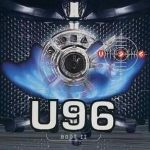
A restyling of Klaus Doldinger’s film theme, Das Boot was a huge number one hit throughout Europe upon its 1991 release. Eventually hitting the top 20 in the summer of 1992, ‘Das Boot’ sounds dated now with its cacophonous stabs of vocoder and muted beats. Whilst the debut album by U96 was largely built around the smash hit single ‘Das Boot’, follow-up album Replugged from 1993 was a far more diverse album, with a range of electronic and ambient sounds. Third album, Club Bizarre was a more dance-flavoured affair. Taken from the latter album, the little-known sequel to Das Boot, cunningly titled Boot II was less immediate than its predecessor, but nonetheless engaging. Boot II employed a characteristically cinematic intro, replete with trademark submarine noises, but was more frenetically paced.. Boot II didn’t emulate the success of their debut techno anthem, but main man Alex Christensen limped on with further U96 material (including further versions of ‘Das Boot’). He has also represented Germany during the 2009 Eurovision contest performing his co-written ‘Miss Kiss Kiss Bang’ track with Oscar Loya. They finished 20th.
Available on the CD album Club Bizarre via Guppy Records
www.myspace.com/alexchristensenu96
DENIM It Fell Off The Back Of A Lorry (1996)

In some respects Felt were the ultimate cult indie band of the 1980s, releasing an impressively prolific ten albums during their existence. The band’s slightly eccentric singer was Lawrence. Not only had he declined to declare his surname, but he’d also allegedly fired the band’s original drummer for having curly hair! Like Sparks, they instilled a sense of humour into their music, delivering great titles such as ‘Let The Snakes Crinkle Their Heads To Death!’ Lawrence’s next project was Denim who released their debut album, Back In Denim in 1992. Amongst Lawrence’s admirers were Pulp who invited Denim to support them during their Different Class tour in 1996. ‘It Fell Off The Back Of A Lorry’ employed a typically satirical lyric, but with the music moving in a more synth-flavoured direction (also check out the hilarious instrumental B-side ‘Snake Bite’). Somehow Denim were bypassed by a generation obsessed with Britpop. Lawrence later formed Go Kart Mozart; their second album bearing the sarcastic title, Tearing Up The Album Chart.
Available on the CD album Denim On Ice via Echo Records
INAURA Soap Opera (1996)
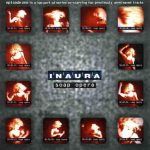
Also known as the band that EMI swallowed up and promptly spat out, Inaura first came to attention when they supported The Human League in 1995. Originally named Poloroid, they had been signed by EMI who had predicted big things for them; spending heavily on promotional videos and a Steve Osborne-produced album. Unfortunately they were lumped in with the ill-fated Romo scene of the mid-1990s and the signs looked ominous for the band when their ill advised, and rather grandiose, 8-minute Pink Floyd-tinged debut single, ‘This Month’s Epic’ flopped – it was no ‘Bohemian Rhapsody’, and garnered little radio play. Follow-up single, the rather more immediate and less pretentious ‘Soap Opera’, sounding like Nine Inch Nails fronting Duran Duran, emulated its predecessor’s fate. An album, One Million Smiles, had been earmarked for release on February 1997 but was cruelly pulled from the schedule after this latest setback. The album was eventually picked up by Org Records in 1998 but by then it was too late.
Available on the CD single Soap Opera via EMI Records
KOMPUTER Valentina Tereshkova (1996)
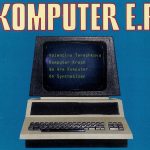
Oscar Wilde once declared, “Talent borrows, genius steals” but this is ridiculous! On this EP by Komputer, members Simon Leonard and David Baker have taken plagiarism to new levels. Seemingly plugging a void created by their Kling Klang counterparts (10 years had lapsed since Kraftwerk’s last album of original material, Electric Café), Komputer released an interesting EP in 1996. The best of the 4 tracks is an ode to the Russian cosmonaut Valentina Tereshkova who famously became the first woman in space; its simple biographical lyrics underscored by a distinctly “Model”-esque tapestry of sounds. Closing EP track ‘Oh Synthesizer’, meanwhile, is a virtual re-writing of ‘Neon Lights’! Incredibly, Leonard and Baker have been recording together for nearly 30 years under various guises. The duo originally began life as experimental synth-pop act I Start Counting and later became the more experimental, dance-oriented act Fortran 5 before returning to their Kraftwerk-inspired roots with Komputer. Some of their best recordings have recently been remastered by Mute Records for this year’s Konnecting compilation.
Available on the CD EP Komputer via Mute Records
http://mute.com/artists/komputer
OUTTA CONTROL Sinful Wishes (1996)
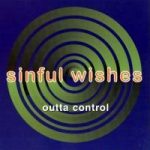
After virtually retiring the Kon Kan name in 1993, veritable musical chameleon Barry Harris began to explore new outlets for his considerable talents. Following the Hi-Energy House album under the pseudonym Top Kat in 1994, he formed Outta Control with keyboardist Rachid Wehbi and vocalist Kimberley Wetmore. Utilising a Eurodance template that was synonymous with Haddaway, Snap! and Culture beat, the trio released a string of little-known singles and one self-titled album. One of these singles was ‘Sinful Wishes’, a song that Harris had originally recorded with Kon Kan in 1993 but one that hadn’t quite met its full potential. The new version, employing a full Eurodance makeover, provided quite a contrast with Kimberley Wetmore belting out Harris’ sexually-charged lyrics in style. The parent album also afforded Harris a chance to indulge in some of his disco influences with Giorgio Moroder and Donna Summer’s 1979 collaboration ‘Our Love’ faithfully covered with Wetmore on vocals. Meanwhile Harris sang the lead on an interesting cover of ‘Together in Electric Dreams’, which was also a single. Harris later formed a highly successful partnership with DJ Chris Cox as Thunderpuss, producing a plethora of highly rated dance remixes for the likes of Madonna, Christina Aguilera and Whitney Houston.
Available on the CD album Outta Control via Interhit Records, currently unavailable
www.discogs.com/artist/Outta+Control
PEACH On My Own (1996)

Electropop trio Peach (or Peach Union in the US) comprised jazz singer Lisa Lamb, Paul Statham (a former member of B-Movie) and writer/producer Pascal Gabriel. Originally released in 1996, their immaculately-produced debut single, ‘On My Own’ was reminiscent of Saint Etienne, but with a definite Belinda Carlisle-esque lilt. Its use in the Gwyneth Paltrow film, Sliding Doors, led to the single being re-released and subsequently hitting the top 40 of the US Billboard chart. Unfortunately, the transatlantic success wasn’t replicated in the UK, with the single stalling at no. 69 in 1998. The trio recorded one album, Audiopeach, before disbanding. Statham has since become a prolific writer and producer, and has worked with the likes of Sophie Ellis-Baxtor, Kylie Minogue, Sarah Nixey and Chew Lips. Gabriel continues his career as a successful producer.
Available on the CD album Audiopeach via Mute Records
SEXUS The Official End Of It All (1996)
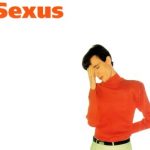
Mancunian duo Sexus were also part of the short lived so-called Romo movement. Signed by ZTT, vocalist David Savage and instrumentalist Paul Southern released their second single, ‘The Official End Of It All’ in 1996. Best described as ABC-meets-Pet Shop Boys, this fine single (like so many from the ill-fated scene) failed to chart, despite lavish praise from both Melody Maker and Smash Hits, and extensive radio play. The duo would soon fall out with ZTT who had, apparently, remixed their next single, ‘How Do You Kiss?’ behind their backs. Both this single and parent Trevor Horn-produced album, The Boyfriend Olympics, were subsequently shelved and SEXUS disappeared. They re-emerged as Psychodelicates and released an album, Go Adventuring, in 2002. Paul Southern later became a novelist.
Available on the CD single The Official End Of It All via ZTT Records
YAMO Stereomatic (1997)

Once amusingly described by OMD’s Andy McCluskey as the “Julio Iglesias of electronic music”, Wolfgang Flür had left Kraftwerk in 1987. According to his insightful autobiography, I Was A Robot published in 2000, he had received an offer to join his fellow Kling Klang compatriot, Karl Bartos, in Elektric Music, but decided to begin his own music journey. This culminated in the release of the debut Yamo single ‘Stereomatic’ in 1997, described as “a homage to the invention of the stereotone”. Displaying a wealth of musical invention that had been missing from his former employers’ recent material (see The Mix), parent album Time Pie was a bold and diverse album, containing a wealth of electronics, samples and ambient textures; its undoubted highlight being the superb 7-minute epic ‘Guiding Ray’ with its enchanting melody, simplistic phrasing, and driving, NEU!-esque beat.
Available on the CD album Time Pie via EMI Electrola
THE ALL SEEING I (featuring Phil Oakey) 1st Man in Space (1999)
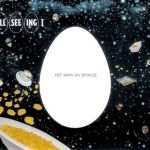
In between the release of The Human League albums Octopus and Secrets, Phil Oakey released this rather quirky collaboration with fellow Sheffield electronic act The All Seeing I in 1999. The trio had already secured a top ten hit with ‘Walk Like A Panther’ (featuring crooner Tony Christie) and ‘1st Man In Space’ was a minor top 30 hit in September. With Oakey having recently penned the lyric “Keep your cornflakes in your freezers” (see ‘Night People’) you could easily be forgiven for thinking that he had also provided the lyrics for ‘1st Man in Space’, but it was in fact Pulp’s Jarvis Cocker (again the Sheffield connection is prevalent here), bemoaning the lack of Golden Nuggets and whingeing about milk carton packaging!
Available on the CD single 1st Man In Space on FFRR Records
www.discogs.com/artist/All+Seeing+I,+The
LES RYTHMES DIGITALES featuring NIK KERSHAW Sometimes (1999)
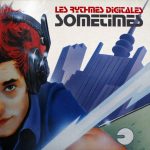
It had been ten years since Nik Kershaw had last recorded an album (The Works), the diminutive singer and guitarist having spent a decade writing and producing songs for the likes of Let Loose and of course, Chesney Hawkes who had enjoyed a huge number one hit with ‘The One and Only’ in 1991. All this was about to change with the imminent release of his excellent album, 15 Minutes, in the spring of 1999. Meanwhile, a certain Jacques Lu Cont was about to release a second album under the name of Les Rythmes Digitales. Lu Cont was of course Stuart Price who is these days more renowned for his writing and production work for the likes of Madonna, Kylie Minogue, The Killers and Take That. Price’s impressive collaboration with Nik Kershaw, the catchy, effervescent ‘Sometimes’, had been heavily influenced by The Human League’s ‘Love Action (I Believe In Love)’. During press interviews at the time, Price insisted that Kershaw had always been his singer of choice for the project, with Phil Oakey too obvious an option. Price (or should I say Lu Cont?!) has recently brought the Les Rythmes Digitales brand out of retirement.
Available on the CD album Darkdancer via Wall Of Sound
www.myspace.com/lesrythmesdigitales0
VNV NATION Standing (1999)

This truly stunning, electro-industrial single is typical of the VNV (Victory Not Vengeance) sound, categorised as “futurepop” by their singer Ronan Harris and employs a trance-like quality that hypnotically captivates the listener. The award-winning single was number one in Germany’s DAC (alternative) chart for an impressive 8 weeks. Currently based in Germany, the duo hail from Dublin and the UK, and have released 8 studio albums since 1995. Like Muse they weave classical music influences into their electronic soundscapes, while much of their music is complemented by intelligent and profound lyrics.
Available on the CD album Burning Empires via Dependent Records
- QUEEN’S MACHINES – How Music Changes Through The Years (1979 – 1984) - July 25, 2021
- SUGAR RUSH – The Story of ‘Sugar Tax’ - May 7, 2021
- Survival – The Story Of ‘Machine and Soul’ - April 30, 2021




